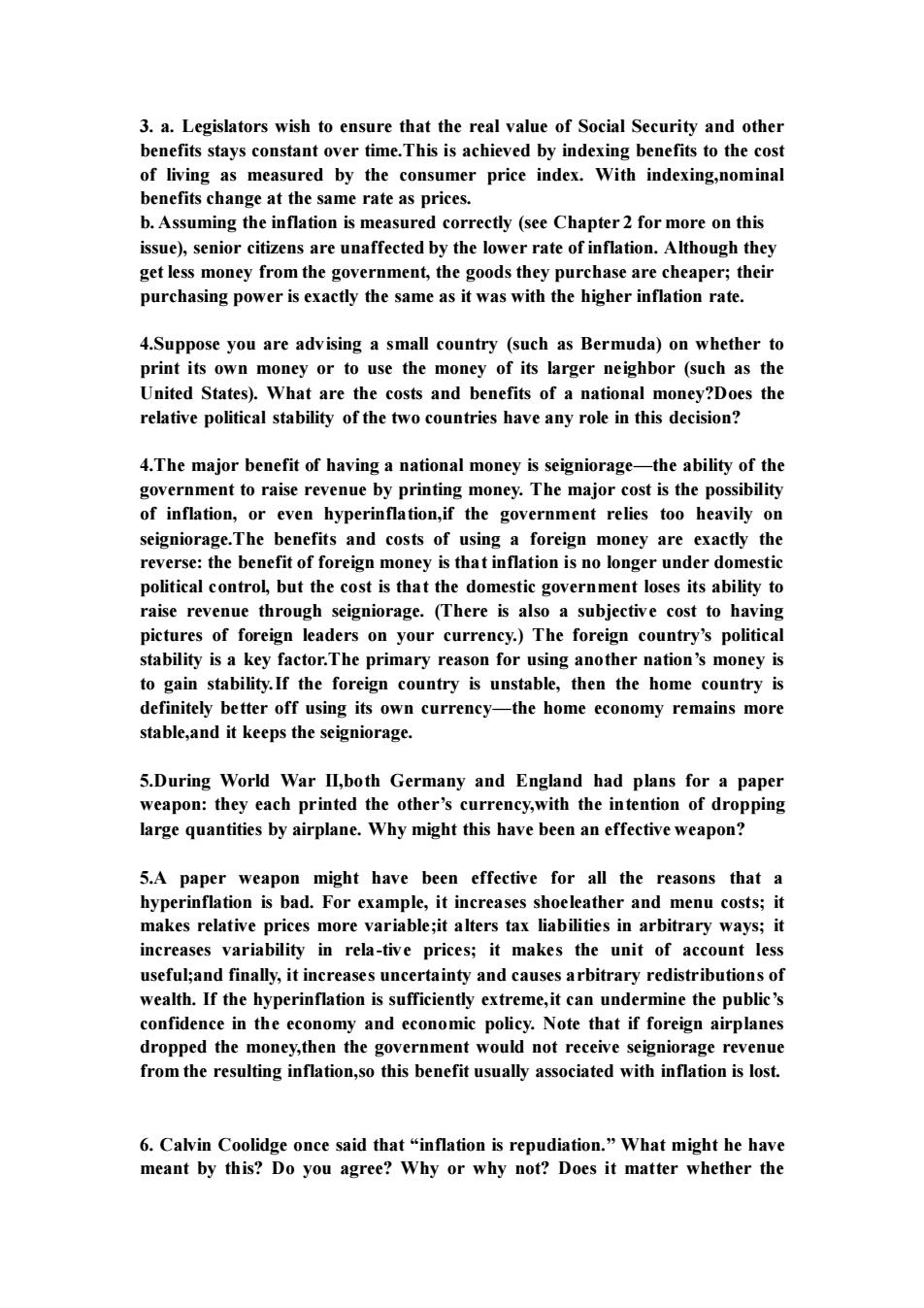正在加载图片...

3.a.legislators wish to ensure that the real value of Social security and other stays constant time.This is achieved by inde s to the co of living as measured by the consumer price index.With xing,nomina benefits change at the same rate as prices. b.Assuming the inflation is measured correctly(see Chapter 2 for more on this issue),senior citizens are unaffected by the lower rate of inflation.Although they get less money from the m nt.the e goods the aper .thei purchasing power is exactly the same as it was witl higher inflation rate 4.Suppose you are advising a small country (such as Bermuda)on whether to print its own money or to use the money of its larger neighbor (such as the United States).What are the costs and benefits of a national money?Does the relative political tability of the two countries have any role in this 4.The major benefit of having a national money is seigniorage-the ability of the government to raise revenue by printing money.The major cost is the possibility of inflation,or even hyperinflation,if the government relies too heavily on seigniorag The efit s and costs of u ising ign oney are the reverse:the bene efit of f oreign money is that infation is no long political control,but the cost is that the domestic government loses its ability to raise revenue through seigniorage.(There is also a subjective cost to having pictures of foreign leaders on your currency.)The foreign country's political stability is a key factor.The prima reason for using another nation's ney is gain stability.If the foreign country is uns e,then the home country is definitely better off using its own currency-the home economy remains more stable,and it keeps the seigniorage. 5.During World War I,both Germany and England had plans for a paper weapon the ach printed the othe vith the int pping large quantities by airplane.Why might this have been an effective weapon? 5.A paper weapon might have been effective for all the reasons that a hyperinflation is bad.For example,it increases shoeleather and menu costs;it makes relative prices more variable;it alters tax liabilities in arbitrary ways;it increases variability in rela-tive prices;it makes the unit account les useful;and finally,it increases uncertainty and causes arbitrary redistributions of wealth.If the hyperinflation is sufficiently extreme,it can undermine the public's confidence in the economy and economic policy.Note that if foreign airplanes dropped the money,then the nment w ould not receive seignio ige revenue from the tion,so efit usually associated with n is 6.Calvin Coolidge once said that "inflation is repudiation."What might he have meant by this?Do you agree?Why or why not?Does it matter whether the 3. a. Legislators wish to ensure that the real value of Social Security and other benefits stays constant over time.This is achieved by indexing benefits to the cost of living as measured by the consumer price index. With indexing,nominal benefits change at the same rate as prices. b. Assuming the inflation is measured correctly (see Chapter 2 for more on this issue), senior citizens are unaffected by the lower rate of inflation. Although they get less money from the government, the goods they purchase are cheaper; their purchasing power is exactly the same as it was with the higher inflation rate. 4.Suppose you are advising a small country (such as Bermuda) on whether to print its own money or to use the money of its larger neighbor (such as the United States). What are the costs and benefits of a national money?Does the relative political stability of the two countries have any role in this decision? 4.The major benefit of having a national money is seigniorage—the ability of the government to raise revenue by printing money. The major cost is the possibility of inflation, or even hyperinflation,if the government relies too heavily on seigniorage.The benefits and costs of using a foreign money are exactly the reverse: the benefit of foreign money is that inflation is no longer under domestic political control, but the cost is that the domestic government loses its ability to raise revenue through seigniorage. (There is also a subjective cost to having pictures of foreign leaders on your currency.) The foreign country’s political stability is a key factor.The primary reason for using another nation’s money is to gain stability.If the foreign country is unstable, then the home country is definitely better off using its own currency—the home economy remains more stable,and it keeps the seigniorage. 5.During World War II,both Germany and England had plans for a paper weapon: they each printed the other’s currency,with the intention of dropping large quantities by airplane. Why might this have been an effective weapon? 5.A paper weapon might have been effective for all the reasons that a hyperinflation is bad. For example, it increases shoeleather and menu costs; it makes relative prices more variable;it alters tax liabilities in arbitrary ways; it increases variability in rela-tive prices; it makes the unit of account less useful;and finally, it increases uncertainty and causes arbitrary redistributions of wealth. If the hyperinflation is sufficiently extreme,it can undermine the public’s confidence in the economy and economic policy. Note that if foreign airplanes dropped the money,then the government would not receive seigniorage revenue from the resulting inflation,so this benefit usually associated with inflation is lost. 6. Calvin Coolidge once said that “inflation is repudiation.’’ What might he have meant by this? Do you agree? Why or why not? Does it matter whether the